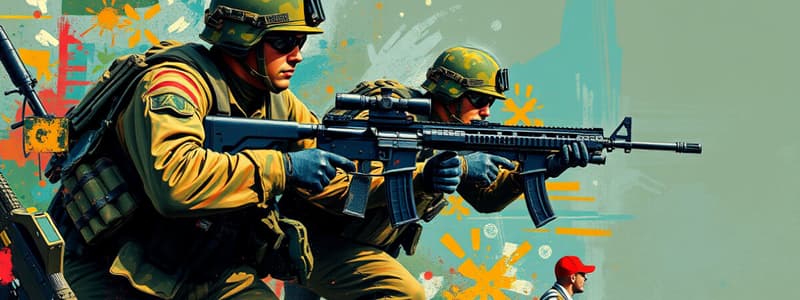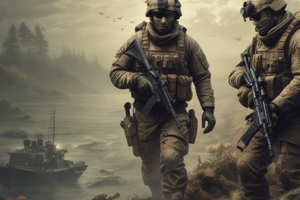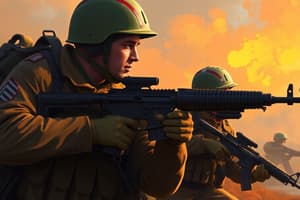Podcast
Questions and Answers
What is a primary focus of physical conditioning in training methods?
What is a primary focus of physical conditioning in training methods?
- Developing language skills
- Enhancing psychological resilience
- Learning urban survival tactics
- Improving endurance, strength, and agility (correct)
Which period saw the development of specialized forces such as the Green Berets and Spetsnaz?
Which period saw the development of specialized forces such as the Green Berets and Spetsnaz?
- Cold War Era (correct)
- Post-9/11 Era
- Vietnam War
- World War I
What does the Counter-Terrorism tactic primarily aim to do?
What does the Counter-Terrorism tactic primarily aim to do?
- Gather intelligence through observation
- Prevent or respond to terrorist threats (correct)
- Support insurgent forces
- Improve psychological resilience
Which of the following is NOT part of the selection process for special forces?
Which of the following is NOT part of the selection process for special forces?
What is the focus of the reconnaissance operational tactic?
What is the focus of the reconnaissance operational tactic?
Which historical elite unit was formed during World War II?
Which historical elite unit was formed during World War II?
What is the objective of psychological operations in operational tactics?
What is the objective of psychological operations in operational tactics?
What aspect is emphasized during the Hell Week of selection?
What aspect is emphasized during the Hell Week of selection?
Study Notes
Training Methods
- Physical Conditioning: Emphasis on endurance, strength, and agility; often includes obstacle courses, long-distance running, and weight training.
- Combat Skills: Extensive training in hand-to-hand combat, firearms proficiency, and close-quarters battle tactics.
- Survival Skills: Instruction in wilderness survival, evasion techniques, and urban survival strategies.
- Language and Cultural Training: Learning local languages and understanding cultural dynamics for effective operations.
- Teamwork and Communication: Exercises designed to improve unit cohesion, trust, and operational communication under stress.
History Of Special Forces
- World War II: Formation of elite units like the British Commandos and U.S. Army Rangers.
- Cold War Era: Development of specialized forces such as the Green Berets (U.S.) and Spetsnaz (Soviet Union) for unconventional warfare.
- Modern Era: Expansion of special operations capabilities post-9/11; focus on counter-terrorism, hostage rescue, and direct action missions.
Operational Tactics
- Direct Action: Engaging in short-duration strikes to seize, destroy, or capture objectives.
- Counter-Terrorism: Operations aimed at preventing or responding to terrorist threats.
- Unconventional Warfare: Supporting insurgent or resistance forces in guerrilla warfare.
- Reconnaissance: Gathering intelligence through covert surveillance and observation missions.
- Psychological Operations: Employing tactics to influence the perceptions and behavior of target audiences.
Selection Process
- Rigorous Assessment: Candidates undergo physical fitness tests, psychological evaluations, and background checks.
- Hell Week: Intense, sleep-deprived training to test endurance and mental resilience.
- Selection Courses: Specialized training courses that assess candidates' tactical skills, teamwork, and leadership capabilities.
- Continuous Evaluation: Ongoing assessments throughout training to ensure suitability for operational roles.
Gear And Equipment
- Firearms: Customized weapons suited for various missions, including rifles, pistols, and sniper systems.
- Protective Gear: Bulletproof vests, helmets, and knee pads designed for enhanced safety during missions.
- Communication Devices: Secure radios and satellite phones for real-time coordination and intelligence sharing.
- Survival Equipment: Tools for navigation, food procurement, and emergency medical care.
- Specialized Clothing: Camouflage uniforms, tactical vests, and weather-resistant gear for diverse environments.
Training Methods
- Physical Conditioning: Focuses on enhancing endurance, strength, and agility through various activities like obstacle courses, long-distance running, and weight training.
- Combat Skills: Involves rigorous training in hand-to-hand combat techniques, firearms proficiency, and tactics for close-quarters battle.
- Survival Skills: Covers wilderness survival, evasion techniques, and urban survival strategies to prepare operatives for diverse environments.
- Language and Cultural Training: Equips operatives with local language skills and cultural insights to facilitate effective interactions during missions.
- Teamwork and Communication: Prioritizes exercises that foster unit cohesion and trust, alongside improving communication under high-stress conditions.
History Of Special Forces
- World War II: Established elite units, such as British Commandos and U.S. Army Rangers, to execute specialized missions.
- Cold War Era: Emergence of forces like U.S. Green Berets and Soviet Spetsnaz, focusing on unconventional warfare and specialized operations.
- Modern Era: Significant expansion of special operations capabilities following the September 11 attacks, emphasizing counter-terrorism, hostage rescue, and direct action.
Operational Tactics
- Direct Action: Conducts rapid strikes aimed at seizing, destroying, or capturing strategic objectives.
- Counter-Terrorism: Focuses on operations intended to deter or respond to terrorist threats and acts.
- Unconventional Warfare: Engages in supporting insurgent forces, applying guerrilla warfare tactics to destabilize adversaries.
- Reconnaissance: Employs covert methods for intelligence gathering through surveillance and observation missions.
- Psychological Operations: Utilizes strategic messaging to influence perceptions and behaviors of target groups.
Selection Process
- Rigorous Assessment: Candidates face a stringent series of physical fitness tests, psychological evaluations, and thorough background investigations.
- Hell Week: A challenging phase of intense training designed to test endurance, mental toughness, and resilience through sleep deprivation.
- Selection Courses: Specialized training modules that evaluate candidates' tactical acumen, teamwork capabilities, and leadership qualities.
- Continuous Evaluation: Regular assessments ensure that candidates maintain the necessary skills and qualities for operational effectiveness throughout their training.
Gear And Equipment
- Firearms: Customized weapons, including rifles, pistols, and sniper systems, designed for specific mission requirements.
- Protective Gear: Equipment like bulletproof vests and helmets enhances safety and survivability in hostile environments.
- Communication Devices: Utilizes secure radios and satellite phones to facilitate real-time coordination and information exchange among units.
- Survival Equipment: Essential tools for navigation, food acquisition, and emergency medical care, critical in survival scenarios.
- Specialized Clothing: Includes camouflage uniforms, tactical vests, and weather-resistant gear tailored for diverse operational contexts.
Studying That Suits You
Use AI to generate personalized quizzes and flashcards to suit your learning preferences.
Description
Explore the various training methods and historical evolution of special forces throughout the decades. From physical conditioning and combat skills to cultural training and teamwork, discover what makes these units unique in their operations. Delve into their origins during WWII and their evolution through modern conflicts.




